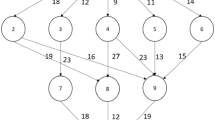Abstract
One of the important classes of computational problems is problem-oriented workflow applications executed in distributed computing environment. A problem-oriented workflow application can be represented by a directed graph whose vertices are tasks and arcs are data flows. For a problem-oriented workflow application, we can get a priori estimates of the task execution time and the amount of data to be transferred between the tasks. A distributed computing environment designed for the execution of such tasks in a certain subject domain is called problem-oriented environment. To efficiently use resources of the distributed computing environment, special scheduling algorithms are applied. Nowadays, a great number of such algorithms have been proposed. Some of them (like the DSC algorithm) take into account specific features of problem-oriented workflow applications. Others (like Min–Min algorithm) take into account many-core structure of nodes of the computational network. However, none of them takes into account both factors. In this paper, a mathematical model of problem-oriented computing environment is constructed, and a new problem-oriented scheduling (POS) algorithm is proposed. The POS algorithm takes into account both specifics of the problem-oriented jobs and multi-core structure of the computing system nodes. Results of computational experiments comparing the POS algorithm with other known scheduling algorithms are presented.
Similar content being viewed by others
References
Buyya, R., Abramson, D., et al., Economic models for resource management and scheduling in grid computing, J. Concurrency Comput.: Practice Experience, 2002, vol. 14, no. 13–15, pp. 1507–1542.
Foster, I. and Kesselman, C., The Grid. Blueprint for a New Computing Infrastructure, San Francisco: Morgan Kaufman, 1999.
Foster, I., Roy, A., and Sander, V., A quality of service architecture that combines resource reservation and application adaptation, Proc. of the 8th Int. Workshop on Quality of Service, Pittsburgh, 2000, pp. 181–188.
Foster, I., Kesselman, C., and Tuecke, S., The anatomy of the grid: Enabling scalable virtual organizations, Int. J. Supercomput. Appl. High Perform. Comput., 2001, vol. 15, no. 3, pp. 200–222.
Jennings, R., Cloud Computing with the Windows Azure Platform, Indianapolis: Wiley, 2009.
Marshall, P., Keahey, K., and Freeman, T., Improving utilization of infrastructure clouds, Proc. of the IEEE/ACM Int. Symp. on Cluster, Cloud and Grid Computing (CCGrid 2011), Newport Beach, CA, 2011, pp. 205–214.
Berman, F., Wolski, R., et al., Application-level scheduling on distributed heterogeneous networks, Proc. of the ACM/IEEE Conf. on Supercomputing, Pittsburgh, 1996, paper no. 39.
Iverson, M. and Ozguner, F., Dynamic, competitive scheduling of multiple DAGs in a distributed heterogeneous environment, Proc. of Seventh Heterogeneous Computing Workshop, Orlando, 1998, pp. 70–78.
Khokhar, A.A., Prasanna, V.K., et al., Heterogeneous computing: Challenges and opportunities, IEEE Comput., 1993, vol. 26, no. 6, pp. 18–27.
Maheswaran, M., Ali, S., et al., Dynamic matching and scheduling of a class of independent tasks onto heterogeneous computing systems, J. Parallel Distrib. Comput., 1999, vol. 59, no. 2, pp. 107–131.
Zhu, Y. and Ni, L.M., A Survey on grid scheduling systems, Technical Report no. SJTU_CS_TR_200309001, Dept. of Computer Science and Engineering, Shanghai Jiao Tong Univ., 2013.
Belhajjame, K., Vargas-Solar, G., and Collet, C., A flexible workflow model for process-oriented applications, Proc. of the Second Int. Conf. on Web Informa-tion Systems Engineering (WISE'01), Kyoto, 2001, vol. 1, no. 1, pp. 72–80.
Dong, F. and Akl, S.G., Scheduling algorithms for grid computing: State of the art and open problems, Technical Report no. 2006-504, Queen’s University, Canada, 2006.
Kim, S.J., A general approach to multiprocessor scheduling, Report TR-88-04, Dept. of Computer Science, University of Texas at Austin, 1988.
Yang, T. and Gerasoulis, A., DSC: Scheduling parallel tasks on an unbounded number of processors, IEEE Trans. Parallel Distrib. Syst., 1994, vol. 5, no. 9, pp. 951–967.
Yu, J., Buyya, R., and Ramamohanarao, K., Workflow scheduling algorithms for grid computing, in Metaheuristics for Scheduling in Distributed Computing Environments, ser. Studies in Computational Intelligence, Xhafa, F. and Abraham, A., Eds., Berlin: Springer, 2008, vol. 146, pp. 173–214.
Gerasoulis, A. and Yang, T., A comparison of clustering heuristics for scheduling directed acyclic graphs on multiprocessors, J. Parallel Distrib. Comput., 1992, vol. 16, no. 4, pp. 276–291.
Sarkar, V., Partitioning and Scheduling Parallel Programs for Execution on Multiprocessors, Cambridge, MA: MIT Press, 1989.
Voevodin, V.V. and Voevodin, Vl.V., Parallel’nye vychisleniya (Parallel Computations), St.-Petersburg: BKhV-Peterburg, 2002.
Author information
Authors and Affiliations
Corresponding author
Additional information
Original Russian Text © L.B. Sokolinsky, A.V. Shamakina, 2016, published in Programmirovanie, 2016, Vol. 42, No. 1.
Rights and permissions
About this article
Cite this article
Sokolinsky, L.B., Shamakina, A.V. Methods of resource management in problem-oriented computing environment. Program Comput Soft 42, 17–26 (2016). https://doi.org/10.1134/S0361768816010084
Received:
Published:
Issue Date:
DOI: https://doi.org/10.1134/S0361768816010084




